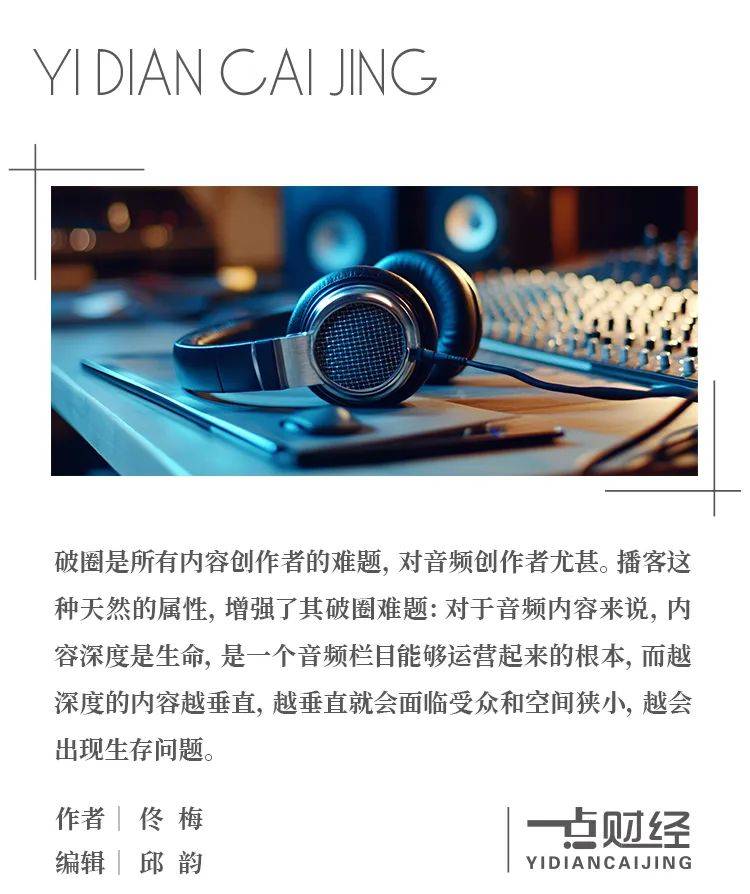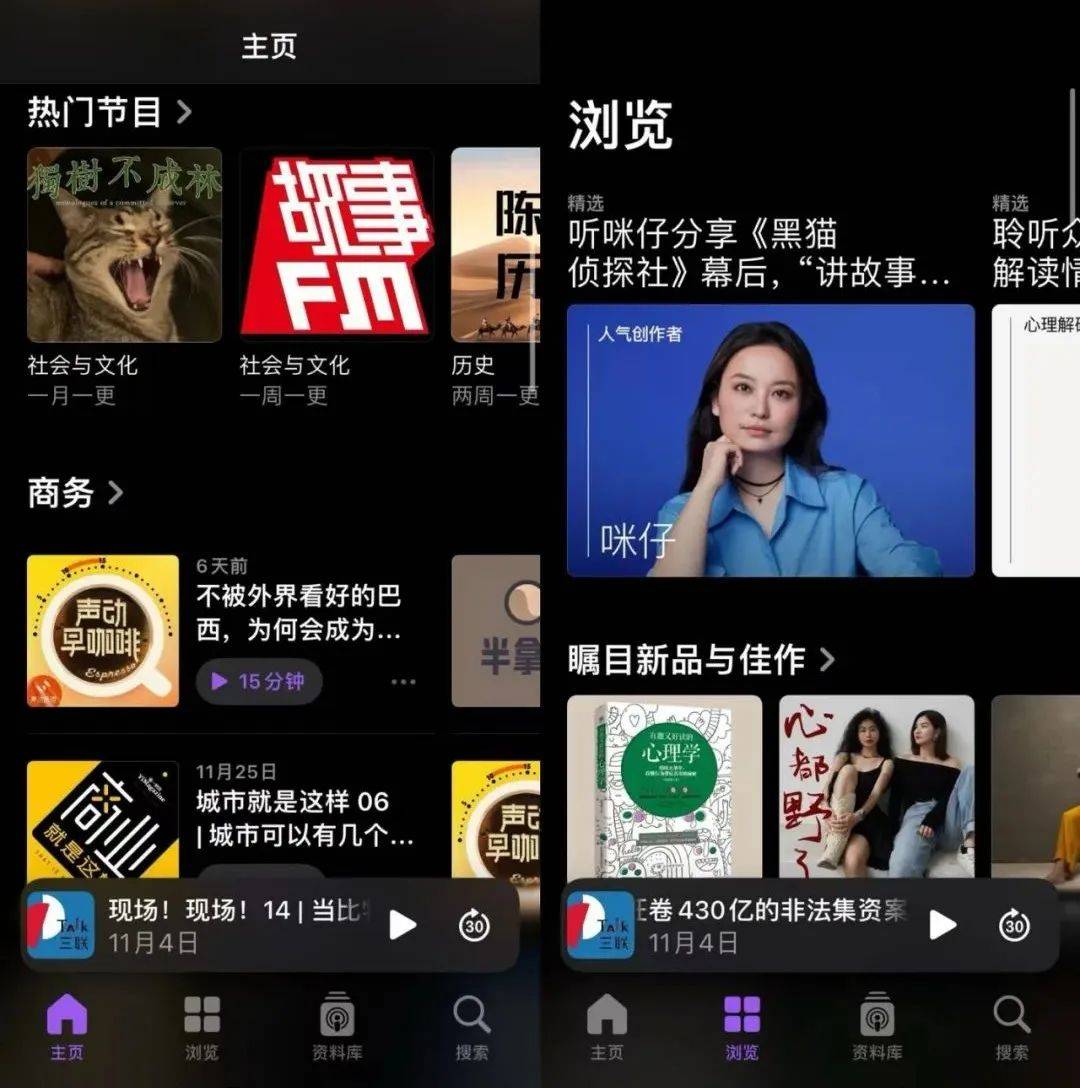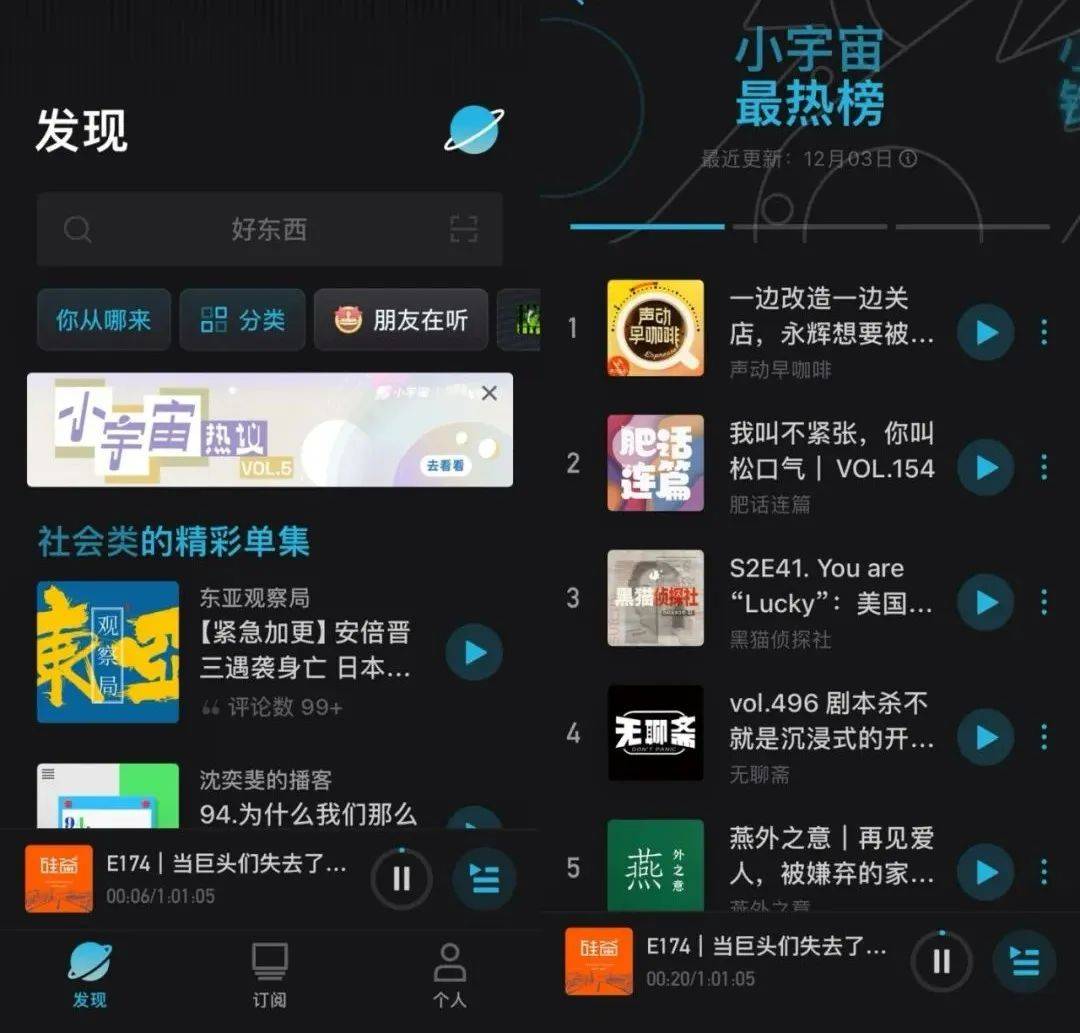Is podcasting finally emerging from its growth struggles?
![]() 12/04 2024
12/04 2024
![]() 672
672

"We often encounter girls offline who say, 'Are you Sisi? I've been listening to your voice all the time, and I didn't expect you to be alive and have a face.'" Sisi, the sparkling girl, is a content creator who hosts and produces the female growth documentary "Sparkling Girls." In 2023, she ventured into podcasting with "The First Business Lesson for Girls," offering her a novel experience.
Bai Guangda, the content editor-in-chief of G-Core, has had a similar experience. Founded in 2010 with a podcast of the same name, G-Core has grown into an interest community focused on game culture, encompassing podcasts, videos, documentaries, game exhibitions, and merchandise. Bai Guangda, who often handles prize redemption at the annual game exhibition, is frequently recognized by attendees who have traveled long distances due to his distinctive voice.
For them, the voice and podcast have become a medium for communicating and engaging with listeners. As the user base expands and platforms like WeChat and Weibo invest, this medium opens up a broader world for them. After multiple entrepreneurial ventures, Sisi, who once felt stuck, has "revived"; Bai Guangda, riding on the coattails of "Black Myth: Wukong," made it onto Weibo's splash screen.
The foundation for the healthy development of an industry lies in the balance of supply and demand and the growth of both parties. The continuous efforts of podcasts like "G-Core," "AoTu DianBo," and "DaNeiMiTan," along with the crossover of content creators like Sisi and Xiao Danny, have fueled the booming development of podcasting. However, on the flip side, how to break out of the niche and achieve profitability remain challenging issues for podcast creators.
Audio Competition
Those who wade into the waters are the first to perceive the tides. Sisi, who has been entrepreneurial in the content field for years, noticed a significant change this year: previously, she was invited to receive awards at events that were primarily live streams, but this year, they were all podcasts. "Accidentally, I caught up with the trend," she said.
Podcasting has a long history but has been referred to as the "first year" annually, remaining relatively niche. In 2012, Apple Podcasts and Himalaya FM launched, followed by NetEase Cloud Music and Lizhi FM in 2013, leading media to dub 2013 the "first year" of audio. Subsequently, with technological advancements and the rise of 4G and 5G, long and short videos captured more of people's attention.

In 2020, Xiaoyuzhou acted like a "catfish" reinvigorating this field. Not only did comprehensive audio platforms like Himalaya FM and Lizhi FM increase their focus on podcasts, but more platforms also turned their attention to podcasting, including national apps like WeChat and Weibo, as well as music platforms like NetEase Cloud Music. Their activities have intensified this year.
For instance, WeChat introduced a dedicated audio listening interface and launched AI voice cloning in November 2024, further enhancing its podcast offerings. Weibo Audio officially began operations this year, gradually introducing features such as audio co-creation, single-episode payment, and "audio empowerment incentives." NetEase Cloud Music launched a podcast anchor support program, aiming to introduce at least 500 video creators into the podcast scene this year.
On December 1, Weibo released audio performance data: In the first three quarters of 2024, the total audio playback on the platform reached 1 billion, with 160,000 posts and over 7,000 creators, accumulating 4 million hours of listening time across the platform. "The scale of audio content consumers is rapidly growing, and the fan base of high-quality audio podcast creators has increased significantly," summarized Zheng Wei, Vice President of Weibo Products.
This growth is not unique to Weibo. Behind the fierce competition among platforms, a new audio era is emerging.
A report released in November by Ritang Park, Himalaya FM, and Ipsos China revealed that the number of Chinese podcast listeners has surpassed 220 million.
Bai Guangda, who has been deeply involved in the audio sector for 14 years and has witnessed numerous ups and downs, holds a cautiously optimistic view of the future, pointing out that the key to industry development lies in "expansion": "Finding ways to lower the threshold and allow more people to join the podcasting ranks is something we aim to achieve. When everyone participates, our industry can have a better ecosystem and development environment."
Undoubtedly, the competition among platforms, especially traffic giants like WeChat and Weibo, has broadened the podcast ecosystem. On the one hand, they have a vast user base that can expand the audience for audio content; for example, WeChat has 1.3 billion monthly active users, and Weibo has 587 million. On the other hand, as content platforms, they can strengthen the ecosystem of audio content creators.
Sisi, originally an interview documentary creator active on WeChat and Weibo, initially used podcasting as a practice ground to hone her interviewing skills and control over the logical structure of long-term content. As she delved deeper into the audio sector, she fell in love with podcasting.
Not only Sisi but also big-name influencers like @Lanxi, @Tulongdediyanzhijing, @Baichequanshuosandao, and @Tongdaodashu, active on platforms like Weibo, excel at producing in-depth and extensive content. Following Weibo's footsteps, they are now diving into podcasting, strengthening the ecosystem of content creators.
"Every year, people say it's the first year for podcasting. These words are repeated annually, but it's unclear which year it truly is," expressed Liu Liuzi, the host of "AoTu DianBo," voicing the sentiments of many podcast practitioners. However, with the competition among platforms like Weibo and the influx of more high-quality creators, the podcast sector is being rapidly expanded like never before.
The Struggle to Break Out
Currently, breaking out of the niche is a challenge for all content creators, particularly those in audio.
As a medium, one of podcasting's advantages is its long user engagement time and high stickiness. This advantage is predicated on the depth of content creation. According to Bai Guangda's observations, podcasts survive either by relying on listeners who still prefer audio despite the video onslaught or by delving deep into a vertical field, enhancing user stickiness with highly compressed content.
This inherent attribute of podcasting exacerbates the challenge of breaking out: For audio content, depth is crucial for sustainability and the operation of an audio column. However, the deeper the content, the more niche it becomes, leading to a narrower audience and limited space, exacerbating survival issues.
According to Liu Liuzi's observations, "While more people are getting into podcasting, it seems like everyone is stuck in a small circle, talking amongst themselves. Those who know about podcasts and listen to them are the same group of people. Even though there has been some improvement in business over the past two years, some brands still don't know what podcasts are and are reluctant to invest or collaborate deeply."
Breaking out requires a combination of depth and breadth, allowing in-depth content to gradually penetrate other circles and attract more people interested in related content.
Through years of podcast operation, Bai Guangda has found that user interests can be cultivated. "They might not have known anything about it before, but once they hear a topic and gain a preliminary understanding, their curiosity is piqued, motivating them to learn and explore further, thereby fostering more resonance with us."
Both interest cultivation and circle penetration rely on the operational capabilities of content creators and platforms.
Currently, different platforms exhibit distinct characteristics in terms of professionalism, interactivity, and breadth: Himalaya FM has a large user base and diverse content; Xiaoyuzhou is more community-oriented with precise targeting; WeChat boasts a robust traffic and content ecosystem; Weibo combines both, offering no issues in interactivity, professionalism, and breadth, and can even facilitate mutual promotion.
The biggest challenge for podcast creators is acquiring new users, but where do these new users come from?
In Sisi's view, creators on podcast platforms can only acquire new users through three channels: chart ranking, cross-promotion, or editor recommendation. Due to limited traffic, many creators struggle to surpass 1,000 followers. In contrast, Weibo, as a large public domain, enables creators to access a vast public traffic through mechanisms like trending topics and sharing.

"It actually provides us with an alternative perspective: whether a relatively niche topic can gain more discussion space on public platforms. Weibo Audio's support in resources and products has shown us this possibility," said Bai Guangda. This year, not only has G-Core content frequently trended on Weibo, but he also made it onto Weibo's splash screen.
New users can come from public domain traffic or other podcasts, a practice known as "cross-promotion" within the industry.
Sandao, the host of "Baichequanshuo," once actively requested cross-promotion from an audio platform, which helped connect him with podcasters in basketball and football. However, nothing materialized. On Weibo, he envisions discussing depression beyond cars and collaborating with other automotive podcasters.
In April last year, Weibo launched the audio co-creation feature. An episode co-created by @Yuxinlie and @Zhengxiaokang received over 800,000 plays, while one by @Panluan and @Lanxi surpassed 500,000 plays. Sisi marveled at Weibo's strong "team-building" ability: "On Weibo, it really feels like a group of people are surrounding you. The operational depth is incredible, leading to a higher breakout rate."
As breaking out remains the primary task for podcasts, creators need to operate on multiple platforms while leveraging each platform's unique characteristics for distinctive operations.
The Difficulty of Growth
A report released by Himalaya FM earlier this year revealed that 50.2% of podcast listeners have paid for podcast content, indicating increasing diversity in podcast monetization.
In reality, however, podcasting is still in its nascent stages of commercialization. The challenge lies in the limited user base, with only a handful of top creators being profitable. One host with 9,000 followers on a podcast platform admitted, "I haven't made any money yet, just earned a tip of 300 yuan from listeners, essentially working for love."
The opportunity for podcast growth lies in its high-quality transmission and strong user stickiness. The "2024 Podcast Industry Report" shows that over 80% of surveyed users listen to podcasts for three days or more each week, with 76.2% listening for more than half an hour a day and nearly 40% listening for over an hour.
Like images and text, the podcast medium is better suited for personalized expression. Sometimes, imperfect recording environments and casual interactions with guests can make users feel the warmth of the podcast. Between in-depth content and casual expression, podcasts have a natural advantage: converting fan stickiness into personal IP.
"To be honest, doing a podcast definitely earns less than before, but you have to do the math. Core fans have increased, and those heavy podcast users have become our die-hard fans," Sisi appreciates the advantages of podcasts in fan stickiness and IP building. "I'm willing to spend a year doing a good podcast and converting casual fans into die-hard ones."
When she was a program producer, she was well-versed in the importance of building an IP. Instead of opening an official Weibo account for the program, she used her personal account. "If you follow me after watching one of my episodes and then see my daily updates, tips, and audio content, won't you also become a fan?"
Weibo itself is a platform that leans towards personification. Through personified expression and interaction with users, it creates an effective mechanism for converting followers or building personal IPs.
Building an IP involves personalized expression, content depth, and interactivity. First, podcasts and Weibo images and texts both lean towards personified expression. Second, the combination of images, texts, and audio, along with the fermentation of audio content, enables the Weibo platform to generate more in-depth content when combined with audio formats. Third, with the help of Weibo, audio creators can enhance interaction with other creators and users.
"After transitioning to building a personal IP, we leveraged Weibo's strong interactivity to meet people in our industry and cross-domain Weibo influencers, participated in events like Weibo Influencer Festival, and rapidly expanded our influence," said Sandao.
Currently, the commercialization path for podcasts is still in the exploratory stage, including advertising placements, merchandise, paid content, and product endorsements. "Podcasts haven't truly commercialized in the past decade plus. If content is to serve commercial interests, it's difficult to strike a balance," Bai Guangda concluded based on his 14 years of experience.
Building personal IPs may not yield immediate commercial results but opens up more possibilities for commercial exploration and provides more time and space for podcast growth.
Conclusion
As early as 2018, the market seemed to sense the approach of a podcasting spring. However, it is only now, with the layout of more platforms, the influx of more content creators, and the participation of more users, that podcasting is finally closer to its spring.
The dilemma facing the development of the podcast ecosystem is that neither users nor content creators can move too fast or too slow. If users move too slowly, commercialization becomes difficult; if content creators move too slowly, user needs cannot be met, affecting the healthy development of the industry. To a certain extent, the entry of platforms like Weibo, which integrate vast user bases and content creators, has resolved the challenges faced by podcasting and is facilitating its rapid and healthy development.







